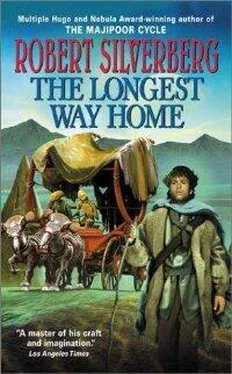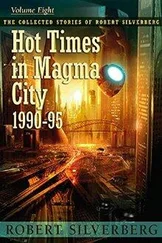His arrival, he saw, was causing a stir. Little groups of curious villagers came out of the houses to inspect him. Most of them hung back, pointing and murmuring, but one, a short, spraddle-legged man with the widest shoulders Joseph had ever seen, scarcely any neck, and a blunt bullet-shaped head, came right up to him and gave him a long moment of intense, piercing scrutiny. “This is Stappin,” whispered the man who was holding him up. “Governor of the town, he is.” And indeed Joseph was readily able to discern the aura of authority, strength, and imperturbable self-confidence that this man radiated. They were traits that he had no difficulty recognizing. His father had them—the Master of any Great House would—and Joseph had seen them in the Ardardin, too, and in some of the other Indigene chieftains along the way. They were necessities of leadership. The aim of Joseph’s entire education had been to enable him to develop those traits in himself.
“Why, is just a boy!” Stappin said, after studying Joseph for a time. “Looks old, he does. But those are young eyes. —Who are you, boy? What are you doing here?”
Joseph dared not admit that he was a Master. But he had failed to prepare himself for this moment. He said the first thing that leaped into his mind, hoping that it was the right thing: “I am Waerna of Ludbrek House.”
There was no reason why they would ever have heard that name all the way down here. But if by some chance they had, and said that they knew Waerna of Ludbrek House and he was an old man, Joseph intended simply to tell them that he was the grandson of the Waerna they knew, and had the same name.
Stappin did not react to the name or his implied claim of Folkish blood, though. Joseph went on, “When the estate where I lived was destroyed in the rebellion, I fled into the mountains. Now I have no home at all.”
The words drained the last of his stamina. His knees turned to water and he slumped down, sagging against the man who held him. Everything became unclear to him after that, until he opened his eyes and discovered that he was inside one of the cottages, lying in an actual bed—no piles of furry skins here—with an actual blanket over him and a pillow under his head. A Folkish woman was looking down at him with motherly concern. By the sputtering light of candles set in sconces against the walls Joseph saw four or five other figures in the room, a boy or youngish man, a girl, and several others lost in the shadows.
The woman said, “Will you take some tea, Waerna?”
He nodded and sat up. The blanket slipped away, showing him that they had removed his clothes: he saw them now, his filthy Indigene robes, lying in a heap beside the bed. It appeared that they had bathed him, too: his skin had a fresh, cool feeling that it had not had in many days.
The woman put a mug of warm tea in his hand. Joseph drank it slowly. It was very mild, faintly sweet, easy to swallow. Afterward the woman watched him for a time, to see how well he kept it down. He was managing it. Something was cooking in another room, some soup or stew simmering over a fire, and the smell of it made him a little uneasy, but the tea seemed to have settled his stomach fairly well.
“Would you like something else to eat?” the woman asked.
“I think so,” Joseph said. The woman turned and said something to the girl, who went out of the room. Joseph was afraid that she was going to bring him whatever it was they were cooking in there, which he knew he would not be able to deal with, but when she came back a little while later she was bearing two slices of bread on a plate, and a mug of warm milk. She knelt beside the bed to offer them to him, smiling encouragingly. He nibbled at the bread, which was soft and airy, much easier to get down than the hard crust he had been offered in the truck, and took a sip or two of the milk. The girl kept looking at him, still smiling, holding out the plate of bread in case he should feel capable of eating more.
He liked the way she smiled. It was a pretty smile, he thought. She looked quite pretty herself, as Folkish girls went: her face very broad, as they all tended to be, strong bones, a wide nose, full lips, but her skin was pale and clear and her hair, straight and cropped short, was a soft golden color. So far as he was able to tell she was about his age, or perhaps a year or two older. I must be feeling better already even to be noticing these things, he told himself.
It troubled him that when he sat up like this the whole upper part of his body was bared to her, and she could see how scrawny he had become. That embarrassed him. He looked like a dead man, a skeleton that somehow still was covered with skin. But then he shivered, and the woman—was she the girl’s mother?—noticed that at once and put a wrap around his shoulders, a woolen thing, coarse and heavy, that felt unpleasantly scratchy against his skin but did at least hide his shrunken arms and hollow chest from view as well as keeping him warm. He took a few more bites of the bread and finished the milk.
“More?” the woman asked.
“I think not. Not just yet.”
They were being very kind to him. Didn’t they suspect, from his slender build and finely formed features and whatever hints of a Master accent in his voice he was unable to conceal, that he was a member of the enemy race? Apparently not. They would know nothing of what a southern Master accent sounded like here, anyway; and as for his long limbs and his tapering nose and his thin lips, well, there had been more than a little interbreeding down through the centuries, and it was not all that uncommon for members of the Folk to show some physical traits of the ruling class. It did seem that they accepted him for what he claimed to be, a young man of their own kind, a refugee from a far-away destroyed House.
“You should rest again now,” the woman said, and they all went out of the room.
He wandered off into a dreamless dozing reverie. Later, he could not possibly have said how much later, the boy or young man who had been in his room before came in with a bowl of the stuff they had been cooking and a plate of a grayish mashed vegetable, and Joseph tried without success to eat some. “I’ll leave it in case you want it,” the boy said. Again Joseph was alone.
Some time later he awoke with a full bladder, stumbled out of bed in the darkness with no good idea of where he ought to go, and tripped over some small piece of furniture, sending himself sprawling with a crash into something else, a little bedside table on which they had left a pitcher of water for him. The pitcher, landing on what seemed to be a stone floor, made a sound as it broke that he was certain would wake the whole household, but no one came. Joseph crouched where he had fallen, trembling, dizzy. After a few moments he rose unsteadily and tiptoed out into the hall. Because they had left him naked below the waist, and he did not want to reveal his emaciated thighs and belly to anyone he might encounter out there, especially not the girl, he took the coverlet from his bed and wrapped it around his hips. In the hallway there was just enough moonlight coming in so that he could see other bedrooms, and hear the sound of snoring coming from one or two of them. But he could not find anything that might be a lavatory.
He needed very badly to go by this time. A door presented itself that turned out to be the main door of the house, and he went outside, into the yard, moving steadily but with an invalid’s slow, cautious pace. All was silent out there. The whole village seemed to be asleep. The night was warm, the air very still. The two smaller moons were in the sky. A big brown dog lay curled up against the picket fence. It opened one yellow eye and made a soft, short growling sound, but did not otherwise react to Joseph’s presence. He walked past it, following along the line of the fence until he judged he was sufficiently far from the house, and opened the coverlet and urinated against a bush. Because all of his bodily functions had become so deranged, it took him an incredibly long time to do it, what seemed like hours. How strange, he thought, to be standing here like this in the yard of a Folkish house, peeing outdoors by moonlight, peeing slowly and endlessly the way an old man does. But all of this is a dream, is it not? It must be. It must.
Читать дальше












